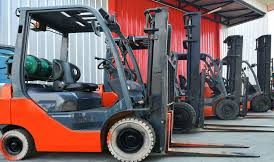Forklifts are indispensable tools in various industries, facilitating the movement of heavy materials and improving productivity. To optimize their performance and ensure safe operations, forklift weights are essential additions. Forklift weights are additional counterweights attached to the forklift to enhance stability, load capacity, and overall efficiency. This article explores the benefits of using forklift weights, highlighting their positive impact on safety, load-handling capabilities, and operational efficiency.
Enhanced Stability
Forklift weights significantly improve the stability of the equipment, particularly when lifting heavy loads or operating on uneven surfaces. By adding additional weight to the rear of the forklift, the center of gravity shifts, reducing the risk of tipping over. This added stability increases operator confidence, allowing for smoother and safer material handling operations.
Increased Load Capacity :
Forklift weights play a vital role in enhancing the load capacity of the equipment. By adding additional counterweights, the forklift can safely handle heavier loads without compromising stability. This increased load capacity eliminates the need for multiple trips or the use of additional equipment, saving time and improving operational efficiency. Forklift weights are especially beneficial when dealing with dense or bulky materials that require a higher weight capacity.
Improved Lifting Performance
The use of forklift weights also enhances the lifting performance of the equipment. By providing additional counterbalance, forklift weights enable forklifts to lift loads higher and more efficiently. With greater lifting capabilities, operators can reach higher storage racks and stack materials in a safer and more organized manner. This leads to better space utilization and optimized warehouse operations.
Operator Safety
Safety is a paramount concern in any material handling operation. Forklift weights contribute significantly to improving operator safety. By adding extra counterweights, forklifts become more stable and less prone to tipping over, reducing the risk of accidents and injuries. The enhanced stability also allows operators to maintain better control over the forklift during sudden stops or changes in direction. Moreover, the increased load capacity provided by forklift weights prevents overloading, minimizing the risk of structural failures and ensuring a safer work environment.
Cost Savings and Efficiency
Utilizing forklift weights offers substantial cost savings and operational efficiency benefits. With higher load capacities, operators can transport more materials in a single trip, reducing the need for additional equipment and minimizing fuel consumption. This results in lower labor costs, increased productivity, and optimized workflow. Forklift weights also reduce the likelihood of product damage by allowing for the secure handling of heavier loads. Furthermore, their use enables companies to maximize storage space by reaching higher levels, eliminating the need for costly expansions or additional storage facilities.
Conclusion
Forklift weights are valuable additions to enhance the safety, load capacity, and operational efficiency of forklifts. By improving stability, increasing load capacity, and enhancing lifting performance, they provide numerous benefits to material handling operations. The use of forklift weights ensures a safer work environment, reduces the risk of accidents, and minimizes product damage. Additionally, they contribute to cost savings, improved productivity, and optimized workflow. Embracing the utilization of forklift weights is a wise investment for companies seeking to enhance their material handling capabilities while prioritizing safety and efficiency.

